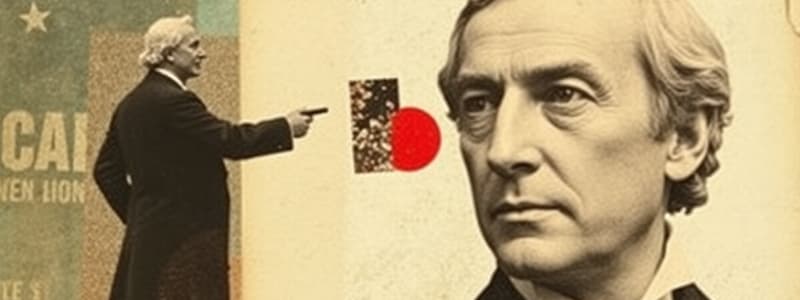Podcast
Questions and Answers
What theory suggests that elected leaders dilute the people's true will?
What theory suggests that elected leaders dilute the people's true will?
- Radical Theory of Representation (correct)
- Participatory Theory of Democracy
- Deliberative Democracy Theory
- Pluralist Theory of Governance
What is one key characteristic of classical democracy?
What is one key characteristic of classical democracy?
- Decision-making through public voting systems
- Decision-making through majority rule
- Decision-making through free discussion (correct)
- Decision-making through legislative mandates
Which political system is described as having an imbalance due to excessive presidential power?
Which political system is described as having an imbalance due to excessive presidential power?
- Federalism
- Parliamentary Democracy
- Hyper-presidentialism (correct)
- Authoritarianism
What major concern did Tocqueville have regarding the majority in democracy?
What major concern did Tocqueville have regarding the majority in democracy?
What does the term 'direct democracy' entail?
What does the term 'direct democracy' entail?
Which concept addresses the issue of ensuring representation of diverse voices in democracy?
Which concept addresses the issue of ensuring representation of diverse voices in democracy?
What philosophical concern does Rousseau raise regarding democracy?
What philosophical concern does Rousseau raise regarding democracy?
What is identified as a key feature of liberal democracy?
What is identified as a key feature of liberal democracy?
What is often a consequence of hyper-presidentialism in democratic systems?
What is often a consequence of hyper-presidentialism in democratic systems?
What did Edmund Burke argue regarding representation?
What did Edmund Burke argue regarding representation?
Flashcards are hidden until you start studying
Study Notes
Representation and Democracy
- Radical Theory of Representation posits that elected leaders may distort the true will of the people.
- Classical democracy is characterized by decision-making through free discussion, ensuring citizen engagement in political deliberations.
Government and Consent
- "Government by consent" is primarily linked to John Locke, emphasizing natural rights and the social contract as foundational principles for legitimate governance.
Historical Perspectives on Democracy
- Conservatives like John Cotton expressed concerns that democracy could disrupt social order and undermine stability.
State and Order
- Hannah Arendt argued that the state serves as a crucial apparatus for maintaining order in liberal societies, preventing chaos and anarchy.
Direct Democracy
- Direct democracy is defined as a system where citizens have the direct power to vote on policies and decisions, contrasting with representative forms of government.
Political Systems and Power
- Hyper-presidentialism describes a political system marked by an imbalance stemming from excessive concentration of power in the presidency.
Madisonian Democracy
- The objective of Madisonian democracy is to prevent tyranny by establishing checks and balances within the government structure, safeguarding against abuses of power.
Majority and Minority Rights
- Tocqueville raised concerns about the majority's potential to oppress minority rights within democratic systems, emphasizing the need for protections for underrepresented groups.
Political Dynasties in the Philippines
- Political dynasties in the Philippines are noted for concentrating power, often marginalizing alternative political voices and perpetuating systemic inequalities in governance.
Representation in Democracy
- Representation addresses the challenge of ensuring diverse voices are included in democratic systems.
Philosophical Critique of Democracy
- Rousseau critiques democracy for relying on idealistic views about human nature, highlighting potential flaws in democratic assumptions.
Features of Liberal Democracy
- A key characteristic of liberal democracy is the recognition of minority rights, ensuring protection for diverse groups.
Decision-Making Principles
- Majority rule is a principle that emphasizes decision-making based on majority votes, particularly in Congress.
Identity Politics Concerns
- Identity politics may foster divisions instead of promoting unity, raising concern regarding its impact on representation.
Importance of Public Accountability
- Public accountability requires governments to be answerable to the electorate, which is essential in preventing abuse of power.
Aristotle's Critique of Democracy
- Aristotle critiqued democracy as the governance by the mediocre, arguing that it prioritizes self-interest over the state's welfare.
Edmund Burke's Argument for Representation
- Edmund Burke supported representation, asserting it is necessary due to the impracticality of direct participation in large societies.
Hyper-Presidentialism Issues
- Hyper-presidentialism can lead to authoritarian tendencies within democratic systems, weakening necessary checks and balances.
Evolution of Democracy in the Philippines
- A significant political change noted is the transition from a two-party system to a multi-party system in the Philippines, reflecting an evolution in democratic practices.
Studying That Suits You
Use AI to generate personalized quizzes and flashcards to suit your learning preferences.




